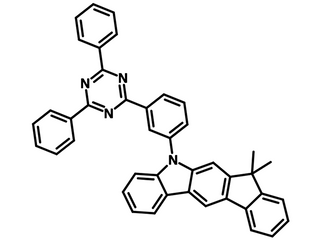DMIC-TRZ
CAS Number 1257248-13-7
High Purity Sublimed Materials, Host Materials, Materials, OLED Materials,Universal Host for Full-Color TADF Devices
TADF host, phosphorescent host, and TADF exciplex with strong electron-accepting ability
Specifications | MSDS | Literature and Reviews | Related Products
DMIC-TRZ is commonly known as a universal host material for full-color TADF devices. It's structure includes an electron accepting 2,4,6-triphenyl-1,3,5-triazine core and an electron donating indeno[2,1-b]carbazole pendant.
Example devices include the use of 5TCZBN, DMAC-BP and 4TCzTPN as sky blue, green, and orange TADF emitters. With DMIC-TRZ as the host, maximum external quantum efficiencies of 19.2%, 21.0% and 23.2% are achieved for the sky blue, green, and orange TADF devices, respectively. The finished TADF devices show ultra-low efficiency roll-off with above 90% of the maximum external quantum efficiencies being maintained even at a brightness of 2000 cd/m2. Three-color all-fluorescence WOLEDs with DMIC-TRZ as the host demonstrate remarkable external quantum efficiency of 31.0%, outstanding color rendering index of 93 with high color quality, and improved efficiency stability and long operational lifetime.
With strong electron-accepting ability, DMIC-TRZ can also form an exciplex with electron-donating materials such as TAPC. A TADF device based on the exciplex couple shows a maximum current efficiency of 25.12 cd/A when the ratio of DMIC-TRZ to TAPC is 6:1, with balanced charge carriers transport and efficient RISC process. An orange phosphorescent OLED was fabricated by employing the same exciplex system as the co-host and PO-01 as the phosphorescence emitter. The device shows a high maximum current efficiency (CE) of 61.15 cd/A, and the roll-off of just 0.13% from the maximum CE to the CE at 1000 cd/m2. Such high device efficiency and ultra-low roll-off in the orange PHOLEDs is attributed to the efficient Förster energy transfer processes and the well balanced charge-transporting abilities.
General Information
| CAS Number | 1257248-13-7 |
|---|---|
| Full Name | 1,3-Dihydro-1,1-dimethyl-3-(3-(4,6-diphenyl-1,3,5-triazin-2-yl)phenyl)indeno[2,1-b]carbazole |
| Chemical Formula | C42H30N4 |
| Molecular Weight | 590.73 g/mol |
| Absorption | 265, 307, 365 nm (in toluene) |
| Photoluminescence | 466 nm |
| HOMO/LUMO | HOMO = 5.76 eV, LUMO = 3.08 eV (ΔEST = 0.14 eV) |
| Classification/Family | Carbazole derivatives, TADF Host materials, Phosphorescent host materials, OLEDs |
Product Details
| Purity | Sublimed > 99% |
|---|---|
| Melting Point | Tg = 142 °C, Td = 373 °C |
| Appearance | White powder/crystals |
Chemical Structure

Device Structure(s)
| Device structure | ITO/MoO3 (6 nm)/CzSi (4 nm)/FSFA (40 nm)/BCzPh (10 nm)/mCBP (5 nm)/1 wt% DBP:DMIC-TRZ (10 nm)/3 wt% CzDBA:DMIC-TRZ (6 nm)/1 wt% 3tPAB:30 wt% CCO-2:mCBP (12 nm)/SF3TRZ (10 nm)/DPPyA (40 nm)/LiF (1 nm)/Al [2] |
|---|---|
| Color |
 White White |
| Max Luminance | 39,910 cd m-2 |
| CIE coordinates | (0.365,0.468) |
| Max Current Efficiency | 87.4 cd/A |
| Max Power Efficiency | 99.6 lm/W |
| Max EQE | 30.8% |
MSDS Documentation
Literature and Reviews
- D. Zhang et al. (2017); Highly Efficient Full-Color Thermally Activated Delayed Fluorescent Organic Light-Emitting Diodes: Extremely Low Efficiency Roll-Off Utilizing a Host with Small Singlet–Triplet Splitting, ACS Appl. Mater. Interfaces, 9 (5), 4769–4777; DOI: 10.1021/acsami.6b15272.
- H. Liu et al. (2023); Realizing High Efficiency and High Color Quality for All-Fluorescence White Organic Light-Emitting Diodes by Interlayer-Sensitizing Configuration with Electron-Capturing Agent, Adv. Funct. Mater., 33 (52), 2309770; DOI: 10.1002/adfm.202309770.
- K. Chen et al. (2022); High efficiency, ultra-low roll-offs in orange phosphorescent organic light-emitting devices using a novel exciplex system, Org. Electron., 106, 106536; DOI: 10.1016/j.orgel.2022.106536.


